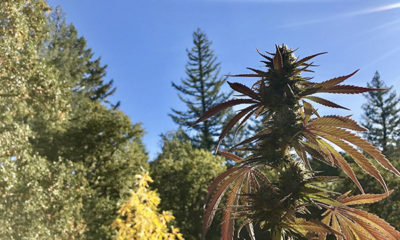
Joint Opinions
Charlotte’s Web Is More Brand Than Strain
The latest catchphrase to grace the pages of medical marijuana legislation in the United States is the term “Charlotte’s Web.” This non-intoxicating strain of marijuana, engineered by Colorado dispensary Realm of Caring, has achieved rockstar status over the course of the past year for its ability to reduce the frequency of seizures in epilepsy patients.
However, while the strain is powerful medicine for some children suffering from the unsavory perils of the debilitating condition, there exists a great deal of misinformation regarding Charlotte’s Web that stands to sour the progress of medical marijuana in the United States before it even has an opportunity to go national.
People who rely solely on CNN and other mainstream media outlets to keep in-the-know about the powers of cannabis oil are likely just as confused as the majority of lawmakers chaotically pushing to legalize it. These news sources have seemingly bamboozled the American public into believing that this proverbial life-preserver known as Charlotte’s Web is the only high-CBD strain available on the market that has the capacity to save children’s lives. However, 2014 Cannabis Cup winners Elite Cannabis Enterprises of Colorado, Elemental Seeds of California, and Michigan’s Detroit Nutrient Company, just to name a few, all produce an award-winning, high-CBD strains that can offer the same effects as the highly-publicized Charlotte’s Web.
The problem is, even though the cannabis plant is a Schedule I dangerous substance with no medicinal value in the eyes of the federal government, the philosophies of Big Marijuana have managed to infiltrate the system — either through ignorant politicians or hefty bribes — and persuaded the majority of the American public that epileptic children across the nation are doomed to die a savage death without access to Charlotte’s Web. With that said, it is certainly no coincidence that 11 states across the nation have approved legislation to legalize high-CBD strains so far this year, with the majority of the documentation specifically naming the strain, or rather the brand Charlotte’s Web.
Recently, state lawmakers from Pennsylvania, Georgia and Tennessee banded together in an effort to legalize this brand on a federal level by introducing the Charlotte’s Web Medical Hemp Act of 2014. At first glance, this bill seems to be a positive move in the grand scheme of nationwide marijuana legalization but upon further inspection, it looks more like an evil scheme to monopolize on CBD-oil and deprive sick children from the medicinal benefits of other important cannabinoids.
Last month, Jason David, whose 7-year-old son Jayden has been using medical marijuana to combat his seizures since 2011, told Ladybud that he does not believe the latest proposal will actually help that many families.
“I wish Charlotte’s Web worked for all epileptic kids, but it doesn’t,” said David. “The worst seizures Jayden ever had on medical cannabis was while we were using Charlotte’s Web.”
David continued by saying that while lawmakers are busy drafting legislation based on what they think they know (or what they are being told by the media monster behind Realm of Caring is true), they are failing to understand that other cannabinoids, like THC and THC-A, are just as beneficial when treating epilepsy.
“They’re not telling the whole truth,” David added. “There’s no way possible that all these children in Colorado could get seizure control and get off all their medications without using different ratios and adding THC and THCA. Charlotte’s Web can work great in the beginning but it’s impossible to get off all the medications and go through benzo withdrawals without being able to play with the THC ratios. ”
This thought-provoking proclamation is not just the opinion of one parent; many others have expressed concerns over passing legislation that only gives patients access to CBD, including Brian Wilson, whose daughter Vivian was featured on Dr. Sanjay Gupta’s CNN special “Weed 2.” He argues that while Charlotte’s Web was beneficial to assisting his daughter in controlling her violent seizures, they would have never been able to do it using only a regimen of high-CBD extracts.
“We saw minor seizure control and developmental progress with CBD alone, but we didn’t see real seizure control until we added measurable levels of THC to the mix,” said Wilson. “Others see great results with THCA added in. Some see very good results with no CBD, like in New Jersey where there is little to no CBD available. The point is, this is highly individualized medicine. There is no magic bullet.”
With this testimony in mind, it stands to reason that legislation only restricted to Charlotte’s Web is not going to be the healing salvation that Realm of Caring and its media song birds want the nation to believe. Unfortunately, the only real solution to this conundrum is for lawmakers to stop dissecting the cannabis plant and filing its compounds under the good, the bad and the ugly, because CBD-only legislation — not to mention a bill aimed at legalizing one specific brand of this medicine — is not good enough for anyone, sick or otherwise.
It is also important to consider that any medical marijuana legislation that the federal government agrees to pass at this juncture will likely be carved in stone and become more difficult to amend than it was to pass in the first place. There is also the possibility that a push to legalize medical marijuana on a federal level right now might confound what advocacy groups have been working towards for decades: the repeal of federal prohibition.
In the end, neither sick nor healthy Americans will benefit from some amended version of the Controlled Substance Act, nor do they have anything to gain from a bill making Charlotte’s Web the McDonald’s of marijuana. It is for this reason that lawmakers need to stop jumping the gun with weak legislation and instead, work collectively towards launching this country into what could be the next industrial revolution. Remember, in a fully-legalized, recreational marijuana market everyone — including the sick children — wins.
How do you feel about CBD-only cannabis laws? Tell us in the comments.























